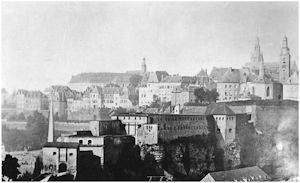"The Gibraltar of the North" Luxembourg
History
 The history of Luxembourg is inherently entwined with that of surrounding countries, peoples, and ruling dynasties. Over time, the territory of Luxembourg has been eroded, whilst its ownership has changed repeatedly, and its political independence has grown gradually.
The history of Luxembourg is inherently entwined with that of surrounding countries, peoples, and ruling dynasties. Over time, the territory of Luxembourg has been eroded, whilst its ownership has changed repeatedly, and its political independence has grown gradually.Although the recorded history of Luxembourg can be traced back to Roman times, the history of Luxembourg proper is considered to begin in 963. The history of Luxembourg properly began with the construction of Luxembourg Castle in the High Middle Ages. It was Siegfried I, count of Ardennes who traded some of his ancestral lands with the monks of the Abbey of St. Maximin in Trier in 963 for an ancient, supposedly Roman, fort named Lucilinburhuc. Modern historians explain the etymology of the word with Letze, meaning fortification which might have referred to either the remains of a Roman watchtower or to a primitive refuge of the early Middle Ages. Over the following five centuries, the powerful House of Luxembourg emerged, but its extinction put an end to Luxembourg's independence. After a brief period of Burgundian rule, Luxembourg passed to the Habsburgs in 1477.
After the Eighty Years' War, Luxembourg became a part of the Southern Netherlands, which passed to the Austrian line of the Habsburg dynasty in 1713. After occupation by Revolutionary France, the 1815 Treaty of Paris transformed Luxembourg into a Grand Duchy in personal union with the Netherlands. The treaty also resulted in the second partition of Luxembourg, the first being in 1658 and the third in 1839. Although these treaties greatly reduced Luxembourg's territory, they increased its independence, which was confirmed after the Luxembourg Crisis in 1867.
In the following decades, Luxembourg fell further into Germany's sphere of influence, particularly after the creation of a separate ruling house in 1890. Luxembourg was occupied by Germany from 1914 until 1918 and again from 1940 until 1944. Since the Second World War, Luxembourg has become one of the world's richest countries, buoyed by a booming financial services sector, political stability, and European integration.
Archives and Records
http://www.anlux.lu National Archives Luxembourg
http://www.bnl.public.lu/fr/index.html Bibliotheque Nationale de Luxembourg
http://www.familux.org GeneLux: Luxembourg-American Genealogical Research
http://www.luxracines.lu/site/en Lux.Racines Genealogical Society
http://www.luxracines.lu/site/en Lux.Racines Genealogical Society
http://www.luxamculturalsociety.org Luxembourg American Cultural Society
http://www.stthomas.edu/libraries/special/rare/bach-dunn Bach-Dunn Collection of Luxembourgiania
http://www.loc.gov/rr/european/imlu/luxem.html Library of Congress- Luxembourgers in America
http://www.luxroots.com Lux Roots
Family Search has six collections of records on microfilm some of which are already digitized and can be accessed online:
Luxembourg deaths and burials 1702-1798
Luxembourg births and baptisms 1662-1840
Luxembourg marriages 1700-1810
Luxembourg notarial records 1621-1821
Luxembourg civil registration 1793-1923
Luxembourg census records 1843-1900
The editor Nicholas Gonner also wrote a book "Die Luxembuger in der Neuen Welt" in 1889. This book describes the cause and pattern of Luxembourg emigration to the U.S. This book was translated into English in 1987 along with a second volume which indexed all the names of people and cities that were mentioned in the Luxembourg Gazette. The Luxembourg has been microfilmed and you can use this index to find various announcements that were mentioned in this paper. The microfilmed records are available at family history libraries and the St Thomas department of Special Collections, O'Shaghnessy Frey Library in St. Paul, Minnesota, Luxembourg American Cultural Society Belgium, Wisconsin and the Iowa Historical Society.
Books
The GGS collection of Germanic Genealogy Books at Minnesota Genealogy Center Mendota Heights, MN, has 8 books with references to Luxembourg including "Germanic Genealogy: A Guide to Worldwide Sources and Migration Patterns, 3rd edition" which has a chapter on Luxembourg emigration. Check the Library for more information.
Flags and Coat of Arms
http://en.wikipedia.org/wiki/Flag_of_Luxembourg Flag of Luxembourg